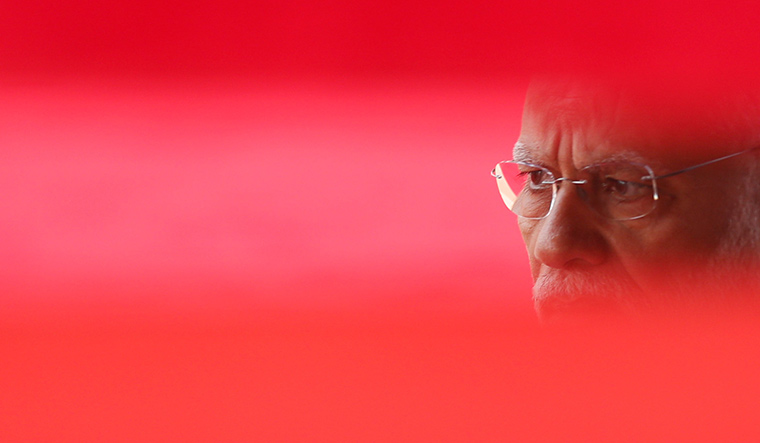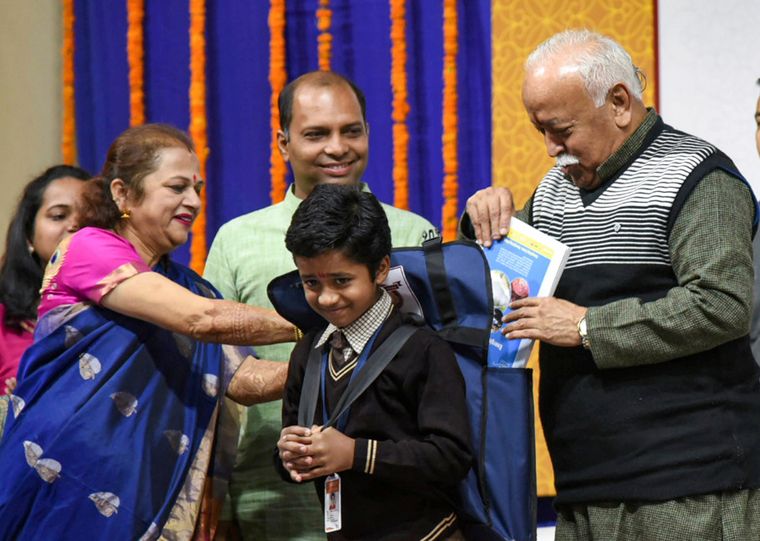During a lecture series in Delhi last September, RSS chief Mohan Bhagwat tried to present a softer side of the 94-year-old right-wing organisation, taking a more accommodative view than the BJP and talking about political and religious inclusivity. During his annual Vijaya Dashami speech three weeks later, however, he was a lot more assertive, sending a message to the government on the Ram temple and urban naxals. Two months later, Bhagwat’s tone became sterner, as he said “only temple will be built in Ayodhya”, and mentioned the yet-to-be-announced national education policy. Many felt it signalled his growing impatience with the Narendra Modi government.
The defeat in the assembly elections in Madhya Pradesh, Rajasthan and Chhattisgarh was a shock for the BJP, and a reality check for those in the party who expected the 2019 Lok Sabha elections to be a cakewalk. Union minister Nitin Gadkari’s comment that the leadership should own up to the party’s poor performance was interpreted as a note of dissent. Gadkari lauding the contributions of Jawaharlal Nehru and Indira Gandhi added to the confusion of the cadre. His outspokenness set tongues wagging over the disquiet within the party.
“The BJP’s defeat in three states that had the strongest party and RSS presence was a pointer that it had diverted from its core supporters and issues,” said an RSS insider. “Though some amount of anti-incumbency was there, the poor show in strongholds showed all was not well. The upper caste anger was visible, and so was their disenchantment. The Central government and the party needed to address it. The message is to go back to the core.”
There has since been a series of initiatives by the government and the party, pointing towards a course correction. Many of the recent policy decisions have been dictated by political compulsions, and they certainly benefit the core constituency of the party. From the announcement of 10 per cent reservation for the upper castes to the curbs on e-tailers, the government fulfilled many of the demands of the RSS and its affiliates, clearly indicating that the BJP was returning to its Hindu vote bank.
True to his style of keeping key initiatives under wraps till the last minute, Modi presented a disruptor of an idea—10 per cent reservation for the economically weaker sections of forward communities in government jobs and educational institutions by amending the Constitution. With a 08 lakh annual income ceiling, it covers a large chunk of the population, which, though historically better placed, felt the angst of losing out to the reservation given to the marginalised. It is also aimed at addressing the reservation demands of upper castes like Jats, Marathas and Patels.
“It sets into motion the process to achieve an effective measure that ensures justice for all sections of society,” Modi said as the bill was passed in the Lok Sabha. The opposition raised concerns over the timing of the bill, calling it hasty and an election stunt, but had no option but to support it, as many of the opposition parties had made similar suggestions in the past.
The bigger challenge for the BJP, however, will be to ensure a positive flow of communication, as reservation based on economic status may cause anxiety among the backward classes and dalits. “The quota [for the backward classes] was given based on the social conditions and oppression faced for centuries. By giving reservation based on economic criteria, the government has accepted that its social welfare schemes have not worked. The bill will not stand in court,” said Lok Sabha deputy speaker M. Thambidurai. His party, the AIADMK, which is in a tacit alliance with the BJP, staged a walkout from the house.
Congress leader K.V. Thomas, MP, supported the bill, but questioned the timing, saying it was done with the elections in mind. He said the bill should have been sent to the Joint Parliamentary Committee for more study.
The quota is likely to face implementation hurdles, as the pool for general category will get reduced to 40 per cent. In an attempt to allay some fears, BJP president Amit Shah said the number of seats in educational institutions would be increased by 10 per cent. “This will benefit students of general category. By this we have ensured welfare of every section of society,” he said.
The Citizenship Bill, which would help non-Muslim migrants from Pakistan, Bangladesh and Afghanistan to get citizenship in India, is a long-standing demand of the sangh parivar, as it would halt the change in the demography of the northeast owing to Muslim migrants. Many northeastern regional parties who are BJP allies, however, are against the bill. Asom Gana Parishad, an NDA member, quit the alliance in Assam.
Two weeks ago, the government tightened the norms for the e-tailers in an attempt to make things easier for small traders and businessmen, who make a sizeable vote bank for the BJP. “The cabinet has announced norms for e-tailers to help the small traders,” said a Union minister. “The decision may have come now, but the discussion had long been on.”
The RSS and its affiliates have been raising the issue. “These e-tailers kept on circumventing the law. But there was no regulation,” said Ashwani Mahajan, convener of the RSS-affiliated Swadeshi Jagaran Manch. “We wrote to the prime minister and the secretary of the department of industrial policy and promotion about the Walmart-Flipkart deal. It was a long-pending demand with the government. The government machinery has been stalling certain programmes. Many of those advisers are now out. The political will of the government is now visible, and we welcome it.”
The government is also likely to announce minimum income for farmers as a sop for the struggling agrarian community. Farm distress was a main reason for the BJP’s loss in the assembly elections in three states.
Changing the education policy has been a major demand of the RSS and its affiliates. “We are waiting,” said Mukul Kanitkar, head of Bharatiya Shikshan Mandal. “We do not know why this delay and when will the policy come. We had given many key suggestions so that education reflects Indians ethos and demands. We suggested to the government to set up Siksha Ayog (Education Commission) which will make policy, approve content and regulate the sector. This should be run by experts. If this Ayog is set up, then there is no need for the HRD ministry.”
Other suggestions include linking vocational training with school education and allowing choice of subjects for students so that the distinction between sciences, humanities and commerce would end. “For example, a student can study English literature with sciences,” said Kanitkar. “IITian Chetan Bhagat became an author. Had he studied English from the beginning, he would have become a better writer.”
The course correction is not limited to the government. The BJP has taken several steps to tide over the discontent among people. Appointments of Health Minister J.P. Nadda and former Gujarat home minister Gordhan Zadafia, along with Narottam Mishra and Dushyant Gautam, as the party’s Lok Sabha election campaign managers in Uttar Pradesh provide an interesting insight into what is playing on the saffron party’s mind.
Nadda, a Brahmin, will help the party woo back the upper castes. Zadafia, who earlier fell out with Modi and floated his own party, has been brought in with the aim of engaging with hindutva elements, especially those belonging to the Visva Hindu Parishad. The ultra-right VHP has not been on good terms with the BJP after Praveen Togadia was ousted from the organisation. Zadafia is close to Togadia.
As the alliance between the Samajwadi Party and the Bahujan Samaj Party is likely to consolidate backward, dalit and Muslim votes, the BJP is focusing on the upper castes. Similarly, Gopal Bhargav, a Brahmin, has been appointed as leader of opposition in Madhya Pradesh, sending a clear signal to core voters.
Another move that gives a glimpse into the BJP’s election strategy is the announcement of 17 panels to manage various aspects of the campaign. Home Minister Rajnath Singh will head the manifesto committee, a panel headed by veteran Murli Manohar Joshi for several elections. Another panel has been set up for getting in touch with the 22 crore beneficiaries of various government schemes, and another to propagate Modi’s Mann Ki Baat radio programme. There is even a committee for organising bike rallies.
It is believed that Gadkari’s proximity to the RSS encouraged him to strike a different note on many issues. However, most BJP leaders do not read much into it. “Gadkariji has always been bindaas (outspoken),” said an MP from Maharashtra. “He does not mince words. His comments should not be seen as an attempt to position himself as a prime minister candidate.”
Gadkari, however, could find himself in that position if the BJP falls short of the magical mark in the Lok Sabha polls.



